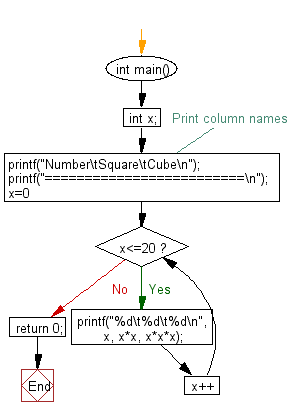C Exercises: Calculate and prints the squares and cubes of the numbers from 0 to 20
C Basic Declarations and Expressions: Exercise-76 with Solution
Write a C program to calculate and prints the squares and cubes of the numbers from 0 to 20 and uses tabs to display them in a table of values.
Sample Solution:
C Code:
#include<stdio.h>
int main()
{
int x;
/* Print column names */
printf("Number\tSquare\tCube\n");
printf("=========================\n");
for(x=0; x<=20; x++)
printf("%d\t%d\t%d\n", x, x*x, x*x*x);
return 0;
}
Sample Output:
Number Square Cube ========================= 0 0 0 1 1 1 2 4 8 3 9 27 4 16 64 5 25 125 6 36 216 7 49 343 8 64 512 9 81 729 10 100 1000 11 121 1331 12 144 1728 13 169 2197 14 196 2744 15 225 3375 16 256 4096 17 289 4913 18 324 5832 19 361 6859 20 400 8000
Pictorial Presentation:
Flowchart:

C programming Code Editor:
Contribute your code and comments through Disqus.
Previous:Write a C program that accepts one seven-digit number and separates the number into its individual digits, and prints the digits separated from one another by two spaces each.
Next: Write a C program that accepts principal amount, rate of interest and days for a loan and calculate the simple interest for the loan, using the following formula.
What is the difficulty level of this exercise?
Test your Programming skills with w3resource's quiz.
C Programming: Tips of the Day
Static variable inside of a function in C
The scope of variable is where the variable name can be seen. Here, x is visible only inside function foo().
The lifetime of a variable is the period over which it exists. If x were defined without the keyword static, the lifetime would be from the entry into foo() to the return from foo(); so it would be re-initialized to 5 on every call.
The keyword static acts to extend the lifetime of a variable to the lifetime of the programme; e.g. initialization occurs once and once only and then the variable retains its value - whatever it has come to be - over all future calls to foo().
Ref : https://bit.ly/3fOq7XP
- New Content published on w3resource:
- HTML-CSS Practical: Exercises, Practice, Solution
- Java Regular Expression: Exercises, Practice, Solution
- Scala Programming Exercises, Practice, Solution
- Python Itertools exercises
- Python Numpy exercises
- Python GeoPy Package exercises
- Python Pandas exercises
- Python nltk exercises
- Python BeautifulSoup exercises
- Form Template
- Composer - PHP Package Manager
- PHPUnit - PHP Testing
- Laravel - PHP Framework
- Angular - JavaScript Framework
- Vue - JavaScript Framework
- Jest - JavaScript Testing Framework
